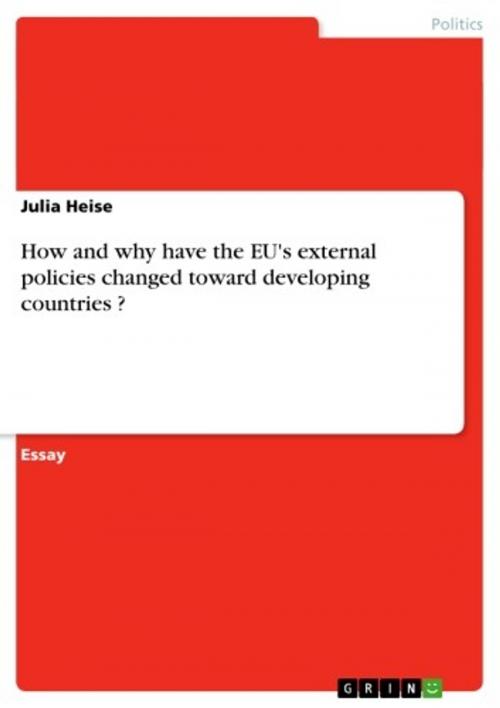How and why have the EU's external policies changed toward developing countries ?
Nonfiction, Social & Cultural Studies, Political Science| Author: | Julia Heise | ISBN: | 9783638379755 |
| Publisher: | GRIN Publishing | Publication: | May 21, 2005 |
| Imprint: | GRIN Publishing | Language: | English |
| Author: | Julia Heise |
| ISBN: | 9783638379755 |
| Publisher: | GRIN Publishing |
| Publication: | May 21, 2005 |
| Imprint: | GRIN Publishing |
| Language: | English |
Essay from the year 2005 in the subject Politics - International Politics - Topic: European Union, grade: 1,0, University of Edinburgh, course: The European Union in International Affairs, 27 entries in the bibliography, language: English, abstract: Relations with developing countries are a long-established part of the European Union's external affairs and the '(...) EU's contributions to international development are not only unsurpassed but have become the standard against which the rest of the world measures itself and is judged.' (Babarinde, 1998: 128).1 For most of the past 40 years the ACP-countries have been at the heart of EU-development affairs. Yet, several factors, mainly caused by the end of the Cold War, contributed to the transformation of the Union's development policy in general. The following paper analyses how and why the EU's external policies have changed towards developing countries, thereby focusing on the ACP-EU relationship. Section one discusses the evolution of the Union's development policy. The Yaoundé- and Lomé-agreements are examined in the subsequent sections. Section four then analyses the developments that led to the most fundamental transformation of the Union's development policy- the Cotonou Agreement, which will be subject to the last section. The paper concludes by evaluating the transformation of EU-development policy in general. 1 The Union's significance as an international actor regarding development policy is for example underlined by agreements with the World Bank or the United Nations Development Programme to produce common development strategies. (Bretherton and Vogler, 1999: 109). In the late 1990s the EC and its Member States accounted for 60 percent of the world aid. Also see European Union (2000) and Grilli (1993).
Essay from the year 2005 in the subject Politics - International Politics - Topic: European Union, grade: 1,0, University of Edinburgh, course: The European Union in International Affairs, 27 entries in the bibliography, language: English, abstract: Relations with developing countries are a long-established part of the European Union's external affairs and the '(...) EU's contributions to international development are not only unsurpassed but have become the standard against which the rest of the world measures itself and is judged.' (Babarinde, 1998: 128).1 For most of the past 40 years the ACP-countries have been at the heart of EU-development affairs. Yet, several factors, mainly caused by the end of the Cold War, contributed to the transformation of the Union's development policy in general. The following paper analyses how and why the EU's external policies have changed towards developing countries, thereby focusing on the ACP-EU relationship. Section one discusses the evolution of the Union's development policy. The Yaoundé- and Lomé-agreements are examined in the subsequent sections. Section four then analyses the developments that led to the most fundamental transformation of the Union's development policy- the Cotonou Agreement, which will be subject to the last section. The paper concludes by evaluating the transformation of EU-development policy in general. 1 The Union's significance as an international actor regarding development policy is for example underlined by agreements with the World Bank or the United Nations Development Programme to produce common development strategies. (Bretherton and Vogler, 1999: 109). In the late 1990s the EC and its Member States accounted for 60 percent of the world aid. Also see European Union (2000) and Grilli (1993).















